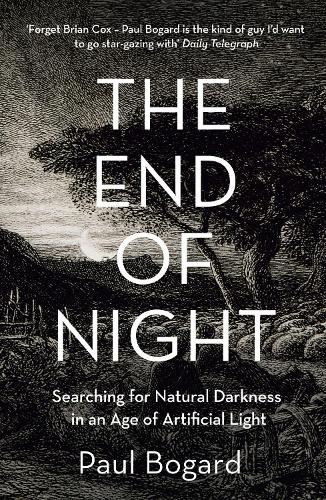
The End of Night: Searching for Natural Darkness in an Age of Artificial Light
(Paperback)
Publishing Details
The End of Night: Searching for Natural Darkness in an Age of Artificial Light
By (Author) Paul Bogard
HarperCollins Publishers
Fourth Estate Ltd
24th February 2014
United Kingdom
Classifications
General
Non Fiction
551.566
Physical Properties
Paperback
336
Width 129mm, Height 198mm, Spine 24mm
270g
Description
Our use of light at night is negatively affecting the natural world in ways were barely beginning to study. Meanwhile, our physical, psychological, and spiritual health are significantly influenced by darkness or a lack thereof; its not a matter of using light at night or not, but rather when and where, how and how much.
We live awash in artificial light. Since the 1930s its increase has been gradual enough that it would be easy to imagine our nights are as dark, or nearly so, as they ever were. But today some three-quarters of Europeans and Americans no longer experience real night and cant imagine real darknessand nearly all of us live in areas considered polluted by light.
In ways weve long understood, in others were just beginning understand, nights natural darkness has always been invaluable for our spiritual health and the health of the natural world, and every living creature suffers from its loss.
In Geography of Night, Paul Bogart investigates what we mean when we talk about the different shades of darkness, about what weve lost, what we still have, what we might regain. He travels from our brightest nights to our darkest, from the intensely-lit cities where public lighting as we know it began, to the sites where real darkness might still remain. Encountering scientists, physicians, activists and writers, Bogart discusses how our use of light at night is negatively affecting the natural world in ways were barely beginning to study; how human physical, psychological, and spiritual health are significantly influenced by darkness or a lack thereof; and how its not a matter of using light at night or not, but rather when and where, how and how much.
A beautiful invocation of our constant companion, the night, which returns every day of our lives, this book reminds us of the power and mystery of the dark.
Reviews
Forget Brian Cox Paul Bogard is the kind of guy Id want to go star-gazing with Bogards delight in the night is infectious The appeal of Bogards book derives not just from his often wide-eyed enthusiasm for his subject, but also from the constellation of characters he encounters on his journeys into the night Stephanie Cross, Sunday Telegraph.
Bogard sets about his investigations with an energetic purposiveness and enterprise To seek to let back in a little of the lost starlight and allow more of nature's shadow to reassert its balm seem to me both modest and wholesome aims, and Bogard's book does much to make a case for them Salley Vickers, Observer
Bogard takes us light years through history, science, psychology, art, folklore and his own travels, looking for an unpolluted dark and starry, starry night Iain Finlayson, The Times
Thought provoking convincing that artificial light has blinded us to the beauties of the night. Perhaps its time to follow him over to the dark side Mail on Sunday
Bogards book is a literary journey in the space of a few pages, we walk with Virginia Woolf, Charles Dickens and Rtif de la Bretonne. It is also a pilgrimage to our capitals of light. This is a rich book with a rewarding appendix of notes. The big thing is that, as you read it, you too will want to reclaim the night and perhaps rediscover the heavens of the Enlightenment Nature Magazine
Does [the end of night] matter Its impossible to read this thorough and engaging survey of the subject (how much more professionally American writers approach non-fiction) and not be convinced that it does David Sexton, Evening Standard
It should be read, and its ardour is impressive The Scotsman
Super little book This is a hunt for a proper night sky and its proper fascinating Sunday Sport
Author Bio
Paul Bogard is a widely published author of journalism, creative nonfiction, and scholarship whose work has appeared in Outside, Audubon, and Backpacker, the Minneapolis StarTribune, and the Albuquerque Journal. His night-related essays have appeared in Creative Nonfiction (The Path and Pull of the Moon, named in 2010 as a notable essay by Best American Essays), the Gettysburg Review (Hearing Moon and Starlight), and elsewhere. The International Dark-Sky Association recently commissioned his article, The Inspiration and Influence of the Night Sky Throughout Literature, for their Catch a Falling Star: A Comprehensive Guide to Light Pollution. Bogard is the editor of Let There Be Night: Testimony on Behalf of the Dark (U of Nevada P, 2008), an anthology that gathers together twenty-nine original essays by scientists, poets, nature writers, and scholars to help us understand the value of darkness and the threats of light pollution. Sandra Steingraber, author of Living Downstream, writes of Let There Be Night, From the inner workings of the melatonin-secreting pineal gland to the mating habits of fireflies and the epiphanies of stargazing, here is a natural history of night. In addition to his written work, Bogard has presented on darkness and light pollution at conferences, universities and colleges, nature centers, national parks, bookstores, and churches around the country. Bogard earned his doctorate in Literature and Environment at the University of Nevada, Reno. His annual interdisciplinary course at Northland College titled Acquainted with the Night, designed to offer students an experience that will forever change the way you experience night, regularly filled to capacity. He now teaches writing at Wake Forest University in North Carolina.
